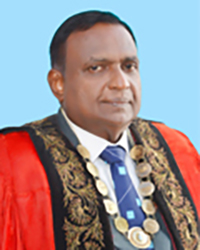President's Message

Eng. K. P. I. U. Dharmapala
Dear fellow Engineers and readers,
Communication is an essential skill for engineers. Engineers are dreamers. They are responsible for dreaming up and building systems. Because their roles require team building and leadership, engineers must be able to clearly communicate complex ideas and technical project plans. They also need to be strong persuaders to see their designs come to life. Building consensus is a giant step toward delivering a project on time and according to specifications.
So what makes you a great speaker? There is so much to learn from famous public speaking figures such as Steve Jobs, Barak Obama, Martin Luther King and many more. There are certain qualities or skills that these people have developed or trained in their lives that make them outstanding public speaking figures.
If you want to become a good speaker, first you have to become a good listener. It is listening to understand but not necessary to speak. Listening involves intention, focused effort, and concentration. Listening can be one of the most powerful tools in your communication arsenal because one must listen to understand the message being told to them. As a result of this deeper understanding, communication can be streamlined because there is a higher level of comprehension that will facilitate practical follow-up questions, conversations, and problem-solving. And just because you heard something doesn’t mean you understood it. You have to listen mindfully.
Words are not the only tool one can use to communicate. There is much more. Gestures one makes, facial expressions, movement of hands, interaction with the audience are some of the non-verbal communication methods embedded in speeches, and these are being practised by any skilled speaker. These commonly overlooked non-verbal communication choices can provide a plethora of information about the intentions, emotions, and motivations. We do this unconsciously, and it happens with every confrontation, conversation, and interaction we engage in. The magic lies in the utilization and active interpretation of these signals to improve your listening skills and your communication skills.
Actively interpreting body language can provide you with an edge in your communication skills. It can also be used as a tool to connect with the individual you are speaking to. Listening with intention can make you understand your colleague, and when paired together with mirroring body language, you can make your colleague feel like you two are alike. This simple trick can facilitate a greater bond of understanding and communication within all aspects of the conversation.
Conveying the messages using as few words as possible, Is another important point to consider. Whether in person, via telephone, or email, convey your message clearly, concise and direct. If you are excessive with your words, the listener will either lose focus or just be unsure as to what it is that you want. Before speaking give some thought as to the message you want to convey. This will prevent you from rambling and causing confusion.
Confidence underpins all effective communication. Other people will believe you will do as you say if you sound confident. Making eye contact, using a firm but friendly tone can give your listener confidence in what you are saying. Being aggressive only makes you less confident.
So in conclusion, listen well before you speak. Understand the conversation going on, the audience you are in, the surrounding, the environment and non verbal communication. Then you can become an effective and efficient communicator.
Eng. K. P. I. U. Dharmapala
President (2020/ 2021)





